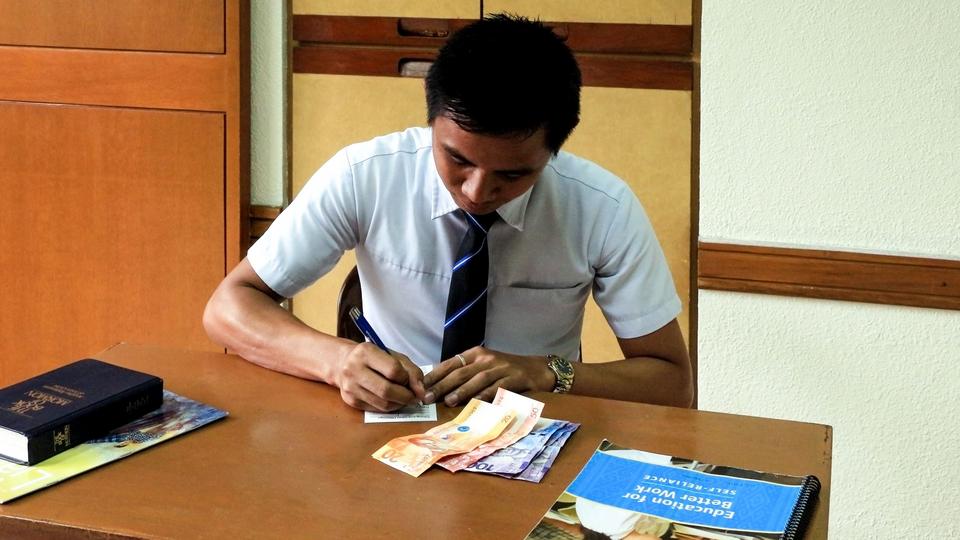As the country continues to fight the spread of COVID-19, Latter-day Saint Charities (LDSC) extends its support to frontliners, government agencies, and local government units by donating the much needed medical supplies.
“We believe that there is hope and that the best way to cope with emergency situations is to help each other,” said Anthony John Balledos, LDSC representative. “We are working closely with our partners, the Philippine Navy Naval Reserve Command Multi-Sectoral Linkaging Committee against COVID-19 and Alagang Kapatid Foundation, to provide emergency relief and hope to those in need.”
- May29-LDSC-Turnover-045.jpg
- LDSC_COVID_Visayas Samar 4.jpg
- ldsc san pablo2.jpeg
- wheelchairs-in-Legazpi.jpg
- Trainees-assessing-recipient_Legazpo.jpg
- LDSC GMAKF wheelchair cebu.jpeg
- Ophthalmology Vision Care
- vision
- Kangaro tubes_LDSC (6 of 10).jpg
- 352_Okt 17_Cabugao, Panitan_Waterproject.JPG
- 332_Okt 17_Cabugao, Panitan_Waterproject.JPG
- Marawi relief
- Zambales Fire
| Temple Square is always beautiful in the springtime. Gardeners work to prepare the ground for General Conference. © 2012 Intellectual Reserve, Inc. All rights reserved. | 1 / 2 |
LDSC were able to donate medical supplies, such as PPEs, face masks, face shields, medical gloves and hygiene kits to the Department of Health, Philippine Navy, Philippine National Police, Office of the Civil Defense, Office of the Presidential Assistant to the Visayas, Office of the President Socsargen, the Court of Appeals, cities, municipalities, and hospitals.
About Latter-day Saint Charities
As the humanitarian arm of The Church of Jesus Christ of Latter-day Saints, Latter-day Saint Charities is an application of the admonition of Jesus Christ to help others in need.
It was established in 1985 in response to the Ethiopian famine. The Church called for a special fast and monetary donation among its membership. Church members donated $6.4 million on that single fast day. Since then, the Church has responded to many other needs around the world and is made possible primarily through the general contributions of its members, known as the Latter-day Saints.
LDSC’s core purpose is to relieve suffering, foster self-reliance, and provide opportunities for service for all people across nationalities and religions. This is made possible through its signature programs, which are Benson Food, Clean Water, Community Projects, Emergency Response, Immunizations, Maternal and Newborn Care, Vision Care, and Wheelchairs.
Member Welfare vs Community Assistance
Like many other followers of Jesus Christ, members of the Church are encouraged to look for ways to help, lift, and love others, especially their neighbors and their communities.

YM-filling-out-FO-form.jpg
Young man from Baguio City filling up a Fast Offering form.© 2020 by Intellectual Reserve, Inc. All rights reserved.Latter-day Saints are taught to obey the ancient Law of the Fast, wherein one Sunday of the month, members go without food and drinks for two consecutive meals and generously donate the money they would have spent on food as a fast offering to the Church.
The fast offering is then collected by the ward (congregation) bishop or branch (a small congregation) president and is used to help meet Church members’ welfare needs. With the assistance of the ward or branch council, local leaders determine how assistance is extended to meet a member’s needs.
As temporal and spiritual self-reliance is at the core of Latter-day Saint teaching, ward and branch leaders teach all members the importance of living and obeying the Law of the Fast, the giving of fast offerings, and learning how to be self-sufficient.
Additionally, when members need assistance with education, finances, or employment, bishops or branch presidents can provide access to helpful resources, invite them to attend a self-reliance class, or visit a self-reliance center where available.
When it comes to helping communities, the Church provides help through Latter-day Saint Charities. LDSC’s unique support structure allows the humanitarian arm to access resources of the Church, which include funding and local volunteer support.
Funding primarily come from the Humanitarian Aid Fund of the Church, philanthropic donors as well as donations from local congregations. The funds are then used to support global and domestic relief efforts that align with LDSC’s major initiatives.
When asked how the LDSC identifies which areas to help, Balledos explained that the Church works through partnerships with local government units, non-government organizations, government agencies, and many other charitable and philanthropic institutions to determine what is needed.
Assistance is rendered without regard to race, religious affiliation, or nationality and is based on the core principles of personal responsibility, community support, self-reliance, and sustainability.
Welfare and Self-Reliance
While the Church is ready to extend support where help is needed, they also emphasize the importance of self-reliance. Hence, many of its welfare and self-reliance projects are geared toward helping members and communities become self-sufficient in the long-term.
“As sons and daughters of God, we are all brothers and sisters. We are taught that we should never expect anyone to take care of this responsibility for ourselves,” Balledos explained.
President Russell M. Nelson, the global leader of The Church of Jesus Christ of Latter-day Saints, further explained the essence of self-sufficiency during his October 2019 General Conference message.
“Church members are responsible for their own spiritual and temporal well-being. Blessed with the gift of agency, they have the privilege of setting their own course, solving their own problems, and striving to become self-reliant,” he expressed.
“Members do this under the inspiration of the Lord and with the labor of their own hands. Especially when it is not convenient and when it takes us out of our comfort zone. Living that second great commandment is the key to becoming a true disciple of Jesus Christ.”